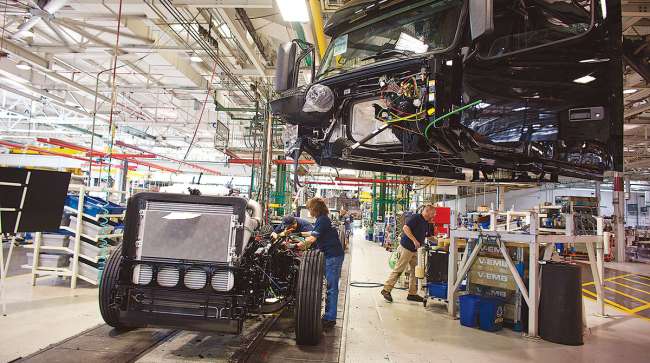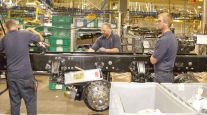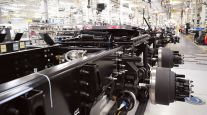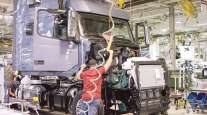Senior Reporter
Class 8 Orders Slip in May

[Stay on top of transportation news: Get TTNews in your inbox.]
North American Class 8 orders slid to 14,000 units, ACT Research reported, citing truck makers’ preliminary data, as underlying conditions that had held back order intake sharply in April, compared with all recent months but one, were little changed.
Orders a year earlier hit 23,072, according to ACT. The last time Class 8 orders were in the 14,000-unit range was February 2020, just before the COVID pandemic really took hold and orders plunged for the next three months.
Net orders in April were 16,037, according to ACT.
Despite broader macro uncertainty about Russia/Ukraine, interest rates, and potential recession, the prevailing theme in trucks is largely unchanged: long backlogs and supply-chain constrained production continue to keep new orders trending...https://t.co/1LtokjJteh pic.twitter.com/EC20UZt12K — ACT Research (@actresearch) June 7, 2022
“The truck makers are just walking on eggshells, maybe reluctant, is a better word. But with the delivery dates as far out as they are right now, they don’t want to commit to pricing for next year,” said ACT Vice President Steve Tam. In large measure, build slots for 2022 are gone.
As a result, a stronger demand-side nuance has appeared, he said, in light of the inability to place a Class 8 order for a timely delivery at a known price.
“With everything that is going on — inflation, the uncertainty related to the war in Ukraine — customers are starting to be a little more conservative,” Tam said. “They have orders in the books. They want delivery of those trucks that they can’t even get, so why should they go and order more. I understand it’s an ongoing process and you have to feed that. It’s the whole ‘going concern’ premise. But you don’t have to do it at the same level.”
FTR pegged preliminary May orders at 13,300.
“It continues to be a strange market impacted by very abnormal circumstances,” said Don Ake, vice president of commercial vehicles, FTR.
“What’s odd is it looks like for the rest of the year it would be a very traditional order scenario where the orders go down in the summer and then are huge in the fall,” for 2023, he said. “What is weird is we have a very traditional order pattern in a very abnormal industry environment.”
Build slots have never been this limited and, theoretically, they could be gone in a couple of months, he added.
❕ Preliminary NA Class 8 net orders in May were 14,000 units, while NA Classes 5-7 net orders moderated to 17,000 units. Complete industry data for May, including final order numbers, will be published by ACT Research in mid-June. ❕https://t.co/MxnFNuYt3U#truck #semitruck pic.twitter.com/XlP0l5XxD4 — ACT Research (@actresearch) June 6, 2022
Meanwhile, impressions on the state of the supply chain can vary.
The reports to FTR from the field indicate things are a little bit better with the supply chain than they were, but FTR does not expect them to get much better the rest of the year.
“We don’t think things will get much worse because of [war in Ukraine and COVID lockdowns in China],” Ake said, “but they kept things from getting better.”
A gauge of supply chain pressure in the U.S. economy fell to the lowest level since December 2020, as activity such as trucking cools from elevated levels with few signs yet of a worrying collapse, Bloomberg News reported.
The Logistics Managers Index dropped to 67.1 in May, the second straight decline from a record of 76.2 reached in March. Faster gains in warehouse and inventory costs offset slower moves in transport prices.
Class 8 orders have totaled 270,000 units over the last 12 months, according to FTR.
“We have been limiting build [rates],” Preston Feight, CEO of Paccar Inc., said in a recent online presentation. “We expect that limitation will continue for some time. We are trying to increase it and having some success.”
A key advantage to Paccar’s supply chain is it focuses on sourcing components in the same areas where its manufacturing operations are located,” said Paccar Senior Vice President Michael Dozier.
“As a result, approximately 95% of our Tier One suppliers are located in the same region as our truck assembly plants,” Dozier said. “We believe this provides a competitive advantage over sourcing components from regions more removed from our operations.”
Feight said Paccar — whose North American truck brands include Peterbilt Motors Co. and Kenworth Truck Co. — was not unique among truck makers in seeing “where we are at and what we can build, seeing if Shanghai comes out of lockdown, seeing what happens in the Ukraine.”
His position is to “watch the world and moderate out the orders in an appropriate way so we are not whipsawing customers around, buyers get a better look at things and it lets us have this steadiness that we think carries on for the future.”
He noted his customers have a lot of freight to haul and Paccar expects that will continue for the time being.
Ake reiterated that monthly Class 8 orders have nothing to do with demand. “Everything is influenced and impacted by the supply chain.”
Want more news? Listen to today's daily briefing below or go here for more info:




